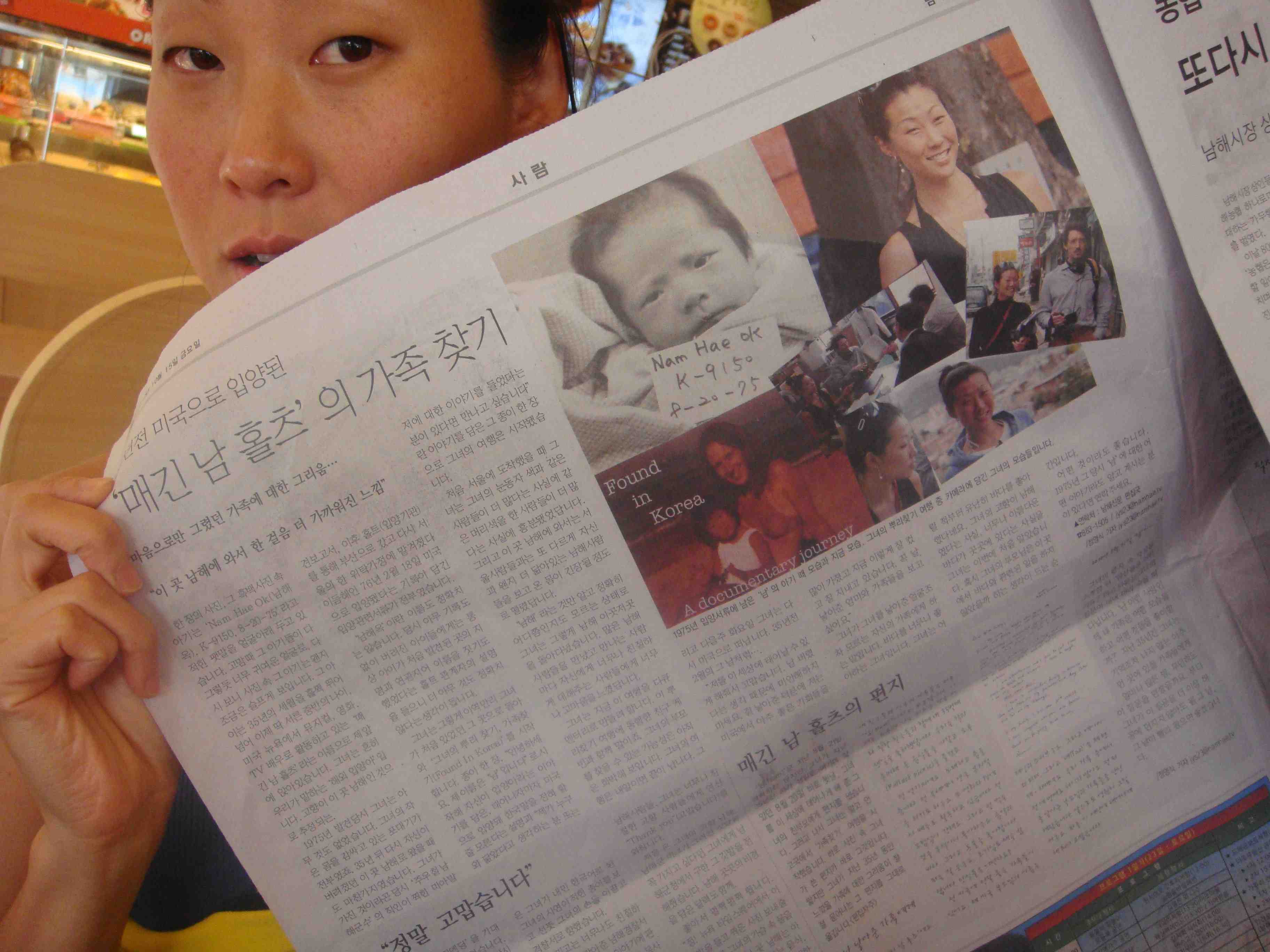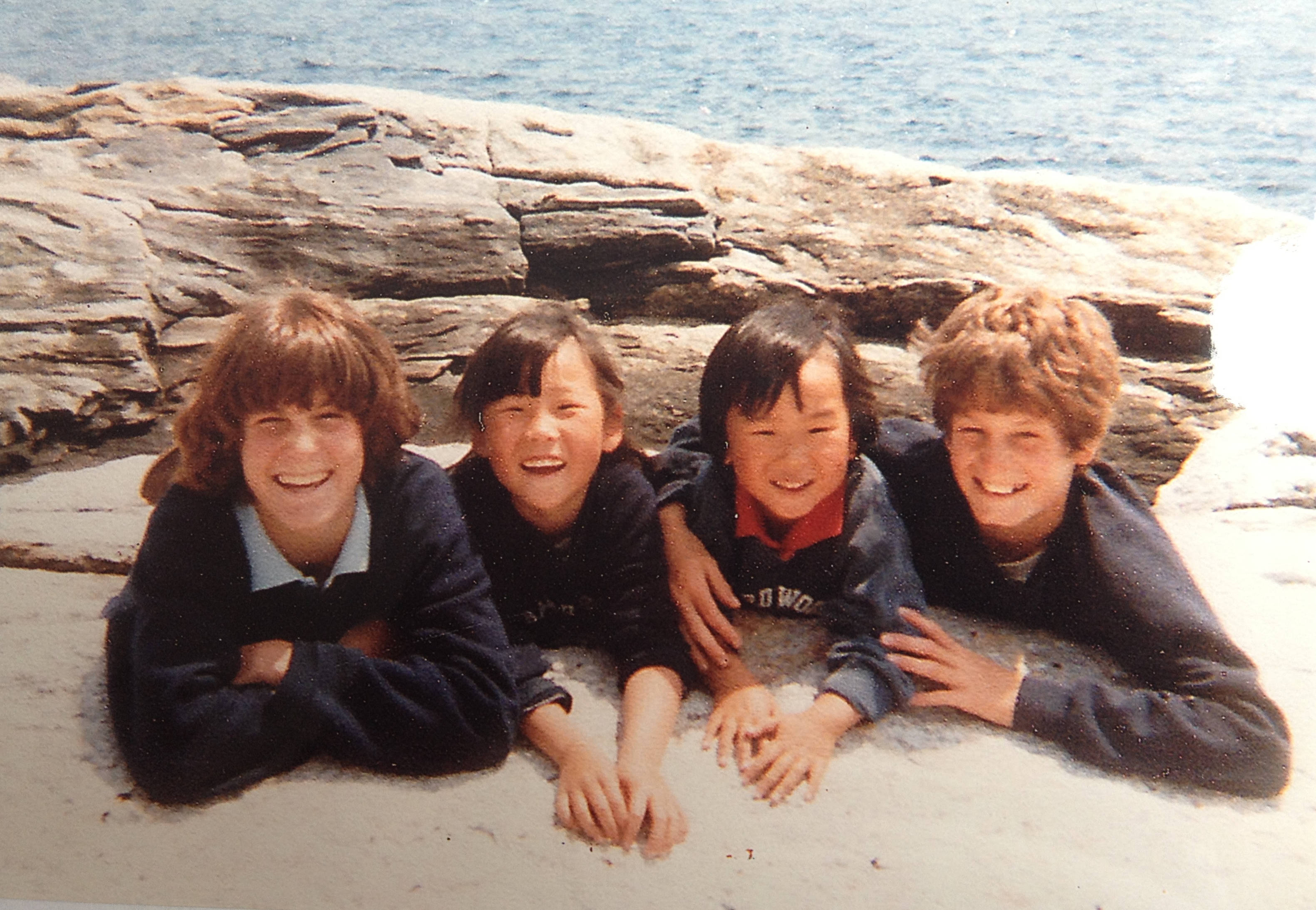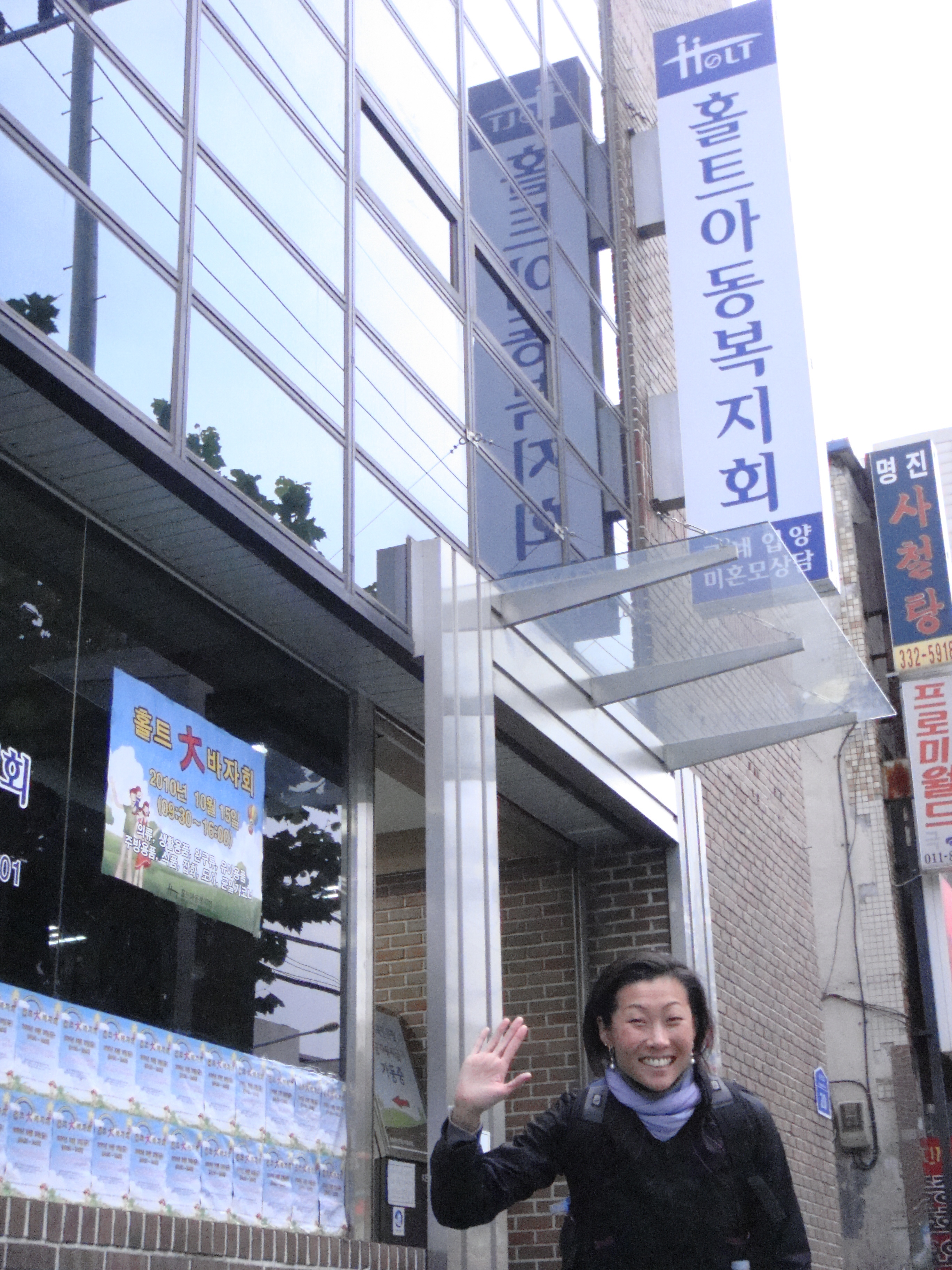Nam Holtz is a Korean adoptee who began a formalized search for her birth family and culture more than five years ago. With the help of a friend and director, Nam documented her return to Korea and today is working to produce her film, Found in Korea, based on her experience. During her 21-day visit to Korea, Nam traveled to three separate cities, retracing the steps of her infanthood, looking for foster family, birth family and other caregivers. What she found was more complicated and compelling than anything she could have initially anticipated. Nam says she hopes that Found in Korea can be a tool for adoptive families and adoptees to discuss birth family and adoption in more organic, natural ways. She also wants to expand the conversation and often limited narratives about the complexities of adoption.
We spoke with Nam on Tuesday, May 14, 2016 to ask some questions about her film, what she’s learned about adoption and the intricate web of strangers who have encouraged her to continue pursuing Found in Korea.
Holt International: You’ve been working on your film Found In Korea for more than 5 years. It’s both a film about adoption and also a very personal project, since it chronicles your search for birth family and birth culture. What has driven you to keep fighting to make this film for so long?
Nam Holtz: As I’ve been working on this film, I’ve become more involved in adoption communities and with other Korean adoptees and other adoption sources. I’m realizing there are some films out there that talk about adoption and are made to help people learn and heal, but there aren’t many.
I’ve received lots of emails and encouragement from people who have asked me to keep making this film as a resource for adoptees or adoptive families or just the greater public. I’ve also learned that just talking about adoption in an honest and open way can be difficult.
I’m really inspired, and I feel like this film is a foot in the door to open up those conversations on a huge level. The more I’m learning about myself, it’s such a healing process. I’m excited to help others experience what I’ve been able to experience. That’s why Found in Korea is not just a film.
HI: What have been some of the most important things that you’ve learned about adoption as a whole, being an adopted person, etc?
NH: I’ve learned that adoption is so complicated. I’ve learned that there are so many issues around adoption and everyone has a point of view or an idea about what’s right or wrong. And, there are a lot of people who are uneducated about adoption. There are so many people who have been touched by adoption in so many ways. It’s amazing how when I bring up my film or my adoption story how many people say, “Oh, my mom is adopted,” or “Oh, we almost adopted.” The populations of people touched by adoption are staggering. This is a much wider audience than we understand. I have a friend who I hadn’t spoken to in 25 years, but when we reconnected she had adopted from Ethiopia. And she told me that as kids, my story had inspired her to want to adopt. She had been a person her whole life who wanted to adopt.
You never know how and what people are absorbing about adoption. It manifests in so many ways. But I wanted people to be able to talk about it. There is so much to learn.
When I was in Korea, I spoke with lots of people about adoption. All of these complete strangers helped me look and search and spread my story. I got the front page of the local paper. There was a man at a restaurant who when he saw my flier, left work and took us to the police station. Another man opened his home to us because he has two adopted Korean kids. A pastor’s wife spent two days to act as my translator. These strangers just blew me away. I also visited an old folk’s home, and the women I spoke with there were so interesting. A lot of them would say things like, “Yeah, at that time, lots of women had to give up their baby.” They talked about adoption from the past like it existed for different reasons than adoption today. They didn’t mention the stigma against unwed mothers. Speaking with them was a unique experience.
HI: What was the hardest part of making this film? What’s been the most rewarding?
NH: There are two things that stick out as the hardest parts. One is being able to go dive into that emotional space every time I work and edit. There were so many things going on in my heart and mind during my trip, and every time I visit the footage, I feel it. It’s very personal in nature, and it’s exhausting, really. But in another way, it’s very healing.
The second hardest thing is the fundraising. When I started, I had no idea how much was entailed in making a quality film. It’s truly a love reason that I’m doing this. It’s definitely coming from me. I can see why people would be curious why it costs so much to make a film. But this is a mere fraction of the cost of any “independent film.”
The most rewarding has been the response from other adoptees and other people. I’ve gotten personal, handwritten notes from adoptees and adoptive parents saying thank you and they believe in me and they can’t wait to see the film. I’ve gotten the most letters from adoptive families who want to do the best job possible raising their children, and they want resources to help their child explore their feelings. The other group is adoptees of a wide age range. They say, I watched your trailer and I can’t wait to see the film. Or, they saw the trailer and it made them cry. They say they relate on so many levels. I’m happy if I can even reach one person, but the response has been overwhelming.
The other group I hear from is Koreans with no affiliation to adoption who say they are in support of me reaching out and looking for my birth family. Lots of Koreans tell me that they hope that we, as adoptees, we find what we are looking for. One woman sent me a care package full of Korean goodies and said, “You are around my age and this is what you would have grown up eating.” I broke into tears. It’s moving that they are thinking about it and reacting and being moved.

HI: For every adopted person, identity is a common and complicated life-long theme. So many adoptees say they feel caught between two worlds — not quite American and not quite Korean. Or, they understand the complicated ways they’ve been shaped by both their birth family and their adoptive family. How has making Found In Korea shaped or change how you define your identity?
NH: I’ve been able to connect with more adoptes than I ever have in my entire life. I see the similarities in all our stories, but if you look closer you realize we are all so different. I’m finding that within the adoptee community, individuality is what really sets us apart. You get to a point where you hear people say, “Yeah, me too, yeah, me too” so many times because they relate to me. But, at a certain point, it becomes just my story. That’s really important as an adoptee. When it switches to not just being a story, or an adoption story, but to being my story. I have my own story. And every adoptee has his or her own story. And they are all unique. That’s powerful, especially for adoptees; that they have a story of their own.
HI: Who is your film intended to reach? What do you hope they learn from it?
NH: The target audience is a huge group — but the first group in my immediate brain is children who are adoptees and their families. We are editing the film so it is something a 10 year old can comprehend, conceptually. The second group would be friends of adoptees, adoptees themselves, neighbors, and extended families, the adoption constellation including birth families. I hope they learn. I hope they come away knowing that their stories are important, and their stories are valid, and that they shouldn’t feel that they need to feel only one way. I hope that people are … I don’t know if brave is the right word … but I hope people feel encouraged to open up the conversation about adoption on a more natural level. I think sometimes people feel afraid to bring up the subject of adoption and I want people to feel like they can. I think people are worried they will say the wrong thing or offend someone. But it’s better to say the wrong thing than not say anything. How else do we learn? And, who’s to say what’s wrong? I also want people to learn some basic things about adoption and Korea. There are educational elements included in the film. Professionals who work with the adoptee community may also gain incite from watching this film.
When my editor and I look at the film, and we look at a difficult scene, we gauge our editing choices on whether a 10-year-old watching will be able to process and understand the scene to the point where they are able to develop their own ideas about what they are seeing. That’s the target age that we are editing on.
HI: On your IndieGoGo page, you say, “It is time for humanity to take a closer look at adoption: the causes, the cures, and the meaning behind the action.” What does that mean to you, and how do you think Found In Korea accomplishes that?
NH: I think that adoption in general is such a complicated concept, and its become thought of in so many different ways. There’re parents who want to make their family bigger. There’re parents who can’t conceive. There’re parents who have always dreamed of adopting. There are birth parents who need help. There are kids in need of homes. Our cultures have created and our world has created adoption, even though it’s been going on forever. So, I think I don’t have the answers. But I think its time for us to look more closely at the reasons adoption exists — there are many — and what is in the best interest of the children in question. And that is going to be different for every child. I truly believe that will be different for every child. My film is my story and a few other people’s story, but it’s an honest look into adoption, but at a little bit of a bigger level. I also think that Found In Korea, the title itself is thought provoking. I was literally found in Korea. I went to find things in Korea. And I found a piece of myself in Korea. So there are all these meanings in the title. It happens to be that this story is about a Korean adoption, but I think it is universal in any persons search for identity that they can look at this film and think, “What in my life am I still looking for? What am I willing to look at? Am I willing to look at the questions I have? Am I even willing to acknowledge the questions I have?”
HI: Is there anything else you think we should know about your film?
NH: I think people should support projects that depict adoptees in a realistic manner. There is very little media, whether it be TV programs, news stories — anything — that highlights and features adoptees, and I think we need more of it out there. I think we need some positive role models for adoptee children, and this isn’t just about my project. It’s about any project that is stepping out and willing to embrace adoptees as role models. I hesitate to call myself a role model because that scares me, but I think that’s what’s going to happen and I feel that huge responsibility. Supporting these projects is supporting people to resonate with. If you look around, it’s not just the whitewashing in the media that you have to look at. It’s what drove me to make my own film. I wanted to make something where I could finally portray myself. There were so few people growing up who even looked vaguely like me, more or less without an accent. I got really excited to think about making a film that people could watch in their own home that would have people who look like me and sound like me. You just don’t see it, not enough, at least.
Nam Holtz | Queens, New York
You can learn more about Nam Holtz and her film Found in Korea here. She is raising money to finish Found in Korea, and we encourage anyone who believes that we need more resources for adoptees, more films about adoption and birth family and more role models in the adoption community to donate what they can to help Nam finish her film.







